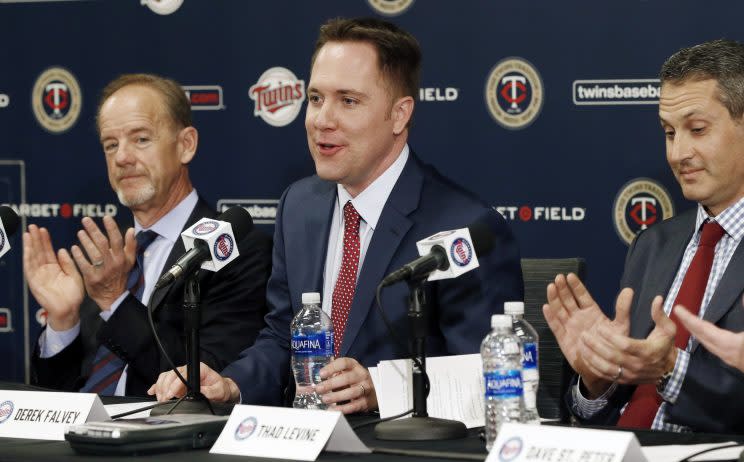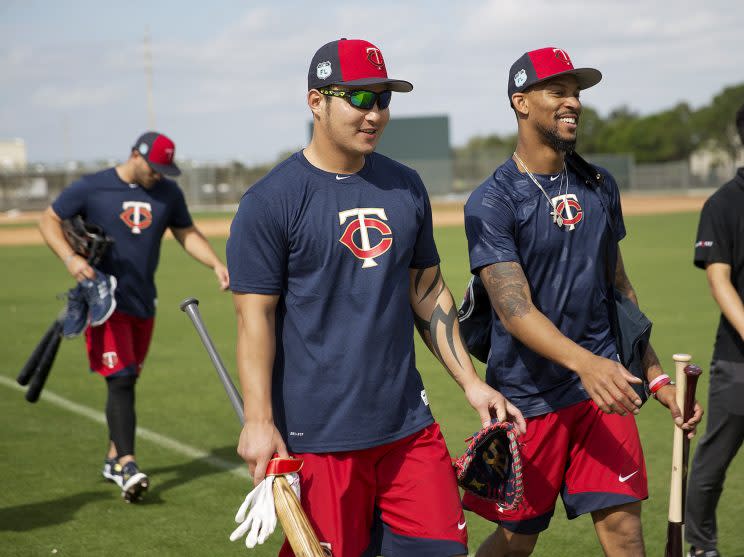Meet baseball's latest boy genius – the son of a pile driver operator

FORT MYERS, Fla. — On a distant field here where the older guys hit, an otherwise quiet campus on Friday morning brought the gift of a couple speakers and from them the luxury of music. Keeps the energy up, you know, when you’ve got a little something to bounce to. Life does require some rhythm, a subtle groove, especially on the back fields, especially after 103 losses.
So somebody’s playlist pinged off the chain-link fences and protesting crows, off the prattling tourists and BP heaters redirected by new ash, until shuffling to something of context.
“It’s the hard knock life for us … ”
Not the Annie version. The Jay Z version.
It was worth a smile, this soundtrack to batting practice, to the ease of solid contact on a February morning, to hard knocks through the morning breeze and into the gaps, and also to the Minnesota Twins of those 103 losses, to five losing seasons in six, to the hard knocks of four last-place finishes in six and a difficult farewell to longtime organizational guardian Terry Ryan.
There’s a big job ahead.
The new man in charge is Derek Falvey. He’s 33 years old. He attended a prep school north of Boston, Trinity College in Connecticut after that, scouted the Cape Cod League for practice (“Super geeky,” he granted), was hired by the Cleveland Indians, ran that gig to Game 7 of the 2016 World Series, and then became chief baseball officer of the Twins.
Maybe you think you know the type. Let’s see.
His father left the house in Lynn, Mass., a reputedly tough town in every sense, in darkness every morning, typically around 3, and came home in darkness every night. Steven Falvey was a construction worker. He operated a pile driver. Pile drivers are big, loud, dirty machines run by tough men that build things like bridges and tunnels.
His mother went to work every morning, too. Candy Falvey was a secretary in a dentist’s office.
From the time Derek’s legs were strong enough and shoulders wide enough he worked on construction sites, sometimes for his uncle, lugging roofing shingles to the tops of ladders. Financial aid – need-based – covered the prep school. More construction jobs and financial aid got him through Trinity. He also pitched for the baseball teams, right up until his shoulder had had enough, until the only way to remain connected to the game he loved were those drives out to the Cape chasing a one-in-a-million career.
Yes, Derek Falvey is that type.
His office on the third floor behind home plate at Hammond Stadium has a desk with a computer on it, a hook with a light jacket on it, a stray book here or there, and otherwise a view of the field and a lot of space for other stuff. The Twins are in the process of inching away from those 103 losses and toward something like a better way. Falvey is out in front of that, as is general manager Thad Levine, who left behind friendships, opportunity and regular postseason relevance in Texas for a shot at making the Twins competitive again.
The arrival of Falvey and Levine means the Twins will catch up to the rest of the game in areas of scouting and intelligence and analysis, assuming they’d fallen behind, if only because of the greater emphasis on them, including more bodies. These things do take time, they do cost money, and they do require a certain amount of patience.
One day it will be decided whether Falvey was the right person to lead the Twins into whatever they are becoming, and until then it must be enough to observe he is a warm, bright and earnest fellow who comes with a good resumé and solid references and could use a picture on a wall or something.
He said he believes the Twins were better than their 59 wins last season, that the addition of a few veterans that would enable the growth of (and not impede the progress of) younger players was preferable to an overhaul, and that his greatest hope – outside a World Series parade – was for a team that is competing as hard at the end of September as it did at the beginning of April.
Let’s not complicate things: He’ll try to acquire good baseball players and make the existing baseball players better, and how exactly he goes about that we’ll all find out together.

Meantime, if Byron Buxton, just 23, can be the guy he was in September – nine home runs, .357 on-base percentage (38 strikeouts but still) – and right-hander Jose Berrios, just 22, can find his way and Max Kepler, just 24, is legit and Miguel Sano, 23, can cut back just a wee bit on the strikeouts, the Twins will track pretty easily toward competence.
So much will go into it. They have the first pick in the June draft. Joe Mauer’s contract expires in two years. There are a thousand decisions coming, all of which will have the Twins rise or fall, sometimes dramatically and sometimes imperceptibly, all of them by the guy who knows his way around a ladder.
“I’m the first person in my family to go to college,” he said in gratitude. “I am the product of a family that was very blue collar. My parents worked every day, all of the day. My sister and I are products of incredibly hard-working people who pushed us, who said, ‘You don’t have to live the life that we lived or any of the rest of our family lived.’ ”
There is so much work ahead. And now you know the type.
More on Yahoo Sports:
• Knicks owner ‘on the level’ with Donald Sterling, says Charles Oakley
• Tim Hardaway’s quest to erase homophobic image
• Michigan coach Harbaugh fires back after cheating accusations
• College hoops Power Rankings: Beware, Duke is coming


